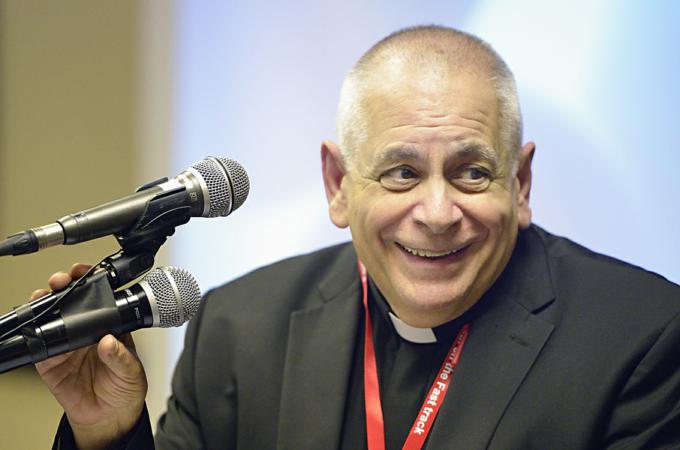New Catholic refugee agency head visits Boston
BOSTON -- "We help all people, both Christians and people of other faith, and we do it because we are Catholics, we do it because Jesus told us to do this," said Msgr. Robert J. Vitillo, the newly appointed Secretary General of the International Catholic Migration Commission (ICMC) during his recent visit to Boston.
Msgr. Vitillo, having just been appointed Secretary General of ICMC in June, was visiting the Boston office Aug. 11 from ICMC headquarters in Geneva, Switzerland. He said he is still learning about the organization, and made the trip to Boston to meet with local donors and staff and plan ahead for the future.
"I see our work here, both in fundraising and especially in awareness-raising, as being very key to who we are and what we do," he said, speaking about the Boston office.
"We need to communicate the great work that's done by our organization with migrants and refugees throughout the world and to others, both to get their support financially, but also their moral support, their prayer support, and try to help influence some of the attitudes and questions about migrants," he said, noting that the Boston office helps ICMC accomplish these goals.
Founded in 1951, ICMC is an international, non-profit organization that strives to protect and serve uprooted people around the world through a myriad of ways, from providing them with basic goods, healthcare, and education, to offering legal assistance and a safe place to live.
It provides a network of Bishop Conferences throughout the world, which it utilizes to provide assistance to people at a local level.
"By helping the bishops, we then extend to the whole Church throughout the world and down to the parish level," Msgr. Vitillo said. "We try to give information to the bishops about the situation of refugees and migrants throughout the world, about their needs, and especially we try to hear from them -- their good practices, the things that they do to reach out to those people who are the strangers and to really make them feel they are part of the community, which is what Jesus told us we needed to do. So, it's the Gospel mandate in action."
ICMC is also partnered with various international organizations, including the Office of the United Nations High Commissioner for Refugees (UNHCR), which, together with ICMC, engages the services of about 400 legal experts to help refugees and migrants resettle, return back to their countries of origin, or, at the very least, be placed in a safe area temporarily.
"The Church gets involved in first accepting people on an emergency basis, but then they have to see which of those people can return to their countries of origin, if they can return safely, hopefully a place that has no more war and conflict, if they can't they see who can be resettled into those countries they first took refuge in. And for those who don't have either of those two solutions, to see who can be resettled in another country," he continued.
He said that because the organization provides assistance to people of all faiths, he sometimes gets asked if, by helping people relocate, the organization he is "helping the terrorists to come and do harm."
"The fact is that the people who are terrorists are not representing true faith in any religion. Some of them instrumentalize and manipulate religion to do the harm that they want to do, or they've been terribly fooled by others who have manipulated them. We do believe that people who are truly religious people who have a relationship with God, and God is all love, that they are not people who are going to incite terrorism in this world," he said.
Wanting to highlight the important role the Catholic Church can play in the life of the refugees and migrants it helps, Msrg. Vitillo recalled a story from back when he was working for Catholic Charities in the Diocese of Patterson, N.J.
He said that once, while he was in New Jersey helping process Cuban refugees, he received a phone call from the Boston Police Department. The caller informed him that "one of the Cubans that we had resettled was murdered here in Boston, and the only thing he had in his pocket was my name and number."
"I was really moved, it was a very terrible tragedy, and he had his sister that we resettled, so I had to tell his sister that her brother had died, and then I had to come (to Boston) and identify the body as well," said Msrg. Vitillo, visibly emotional.
"But, I think it shows how much the Church gets involved in accompanying people, and how much trust these people, who have gone through terrible tragedies themselves, put in the Church to see us as the point of contact in something like this," he said.



















